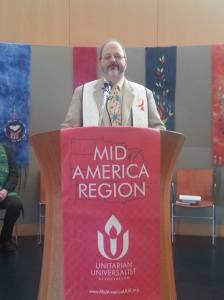I first learned of Unitarian Universalism in a bar. In 1985-86, I took doctoral courses in higher education administration and business at the University of Pittsburgh where I have worked for a few years after earning my M.B.A.. After several terms, I realized that my program had no interest in married, part-time students whose career path did not include entering the faculty ranks. A fellow student, who sensed my growing frustration, invited me to a drink one evening. After much venting and a diatribe on my views about life, she remarked that I sounded like a brochure she picked up the week before at a local Unitarian church. My path to the ministry began with finding a community of kindred spirits.
Congregant and Lay Leader
I joined the East Suburban Unitarian Universalist Church and soon was President of the small, lay-led congregation. For 25 years, the congregation had debated between investing first i

Flagpole at Midland
n a minister or a building. I decided that we needed to make a choice or risk facing another quarter century of indecision. During my term of management, we wrote a long-range plan and decided to call a minister. I subsequently led the strategic planning effort at my current church (First Pittsburgh), which made our 100-year-old building accessible.
Seeking a larger religious education program for my children led to the First Unitarian Church of Pittsburgh, where I taught almost every Sunday morning for 15 years. After leading primary grade classes for two years, I hesitatingly took on the junior high class, where I quickly found an exciting home. The following year, I moved up with those youth into the high school class. Almost no religious education curricula were in print for senior high youth at that time, so I began creating programs for the class. With the publication of Sacred Threads, my journey toward the ministry continued with the sharing of knowledge and wisdom with youth.
About that same time, I attended my first Ohio-Meadville District youth conference. Arriving on Friday night, I found youth hugging each other and sharing an emotional bond that definitely challenged my comfort levels. By Sunday morning, however, I gladly joined in the “hugger-pillar” and opened myself to others that I barely knew in a way I did not think possible. That moment of shared love was the first time I felt what one would label a call to the ministry.
Over the years, I have been privileged to work with some amazing young people. My efforts as a mentor to these youth help them mature and realize dreams and aspirations. But, I also learned that leadership is not about doing everything by yourself. Leadership is about showing a way and then encouraging others to join in the trail blazing. Youth empowerment does not mean that adults abdicate their responsibility. On the contrary, adult leadership within a framework promoting youth empowerment requires a high level of participation and nurturing.
My call to the ministry is the result of the many factors: finding a community that shared my ideas; helping churches manage difficult decisions; promoting a search for knowledge among our youth; growing to freely share my love for our church and our community; and providing an example of leadership so that future generations will carry on the work of this religion.
Religious Influences

Meme I created, 2014
People who use reason, creativity, and perseverance against substantial odds, challenging paradigms that limit human thought and imagination influence my religious identity powerfully. My favorite books and movies highlight underdogs striving against injustice, or place into extreme situations people who craft solutions deemed untenable by established authority. The romantic in me admires martyrs such as Weigel and Servetus, Reeb and Liuzzo, King and Gandhi, or Valentine Michael Smith from Heinlein’s Stranger in a Strange Land. A philosophy of life worth living deserves necessary sacrifices. My bureaucratic side appreciates the less dramatic efforts of leaders like Frederick May Eliot and Robert West, who used their considerable talents to achieve significant organizational goals within a spiritual framework.
Theologically, I hold the ideas of great teachers and religious movements in high regard, including the Beatitudes of Jesus, the Analects of Kung Fu Tse, the Five Pillars of Islam, and the Eight-Fold Path of Buddhism. I do not believe in a supernatural godlike entity, but am comfortable knowing that mysteries exist that we may never unravel. I support humanist principles, but wish that the various Humanist organizations could find common ground. I see Unitarian Universalism as the one religion that treasures the search for truth, defends the tools for searching, and holds dear the seeker and the universe that is our laboratory.
Intellectual Influences

Preaching in Ann Arbor
Intellectually, I owe so much to my father, Henry Liebmann. He taught me a moral code of living based on truth, honesty, reason, and relevance. He engendered in me a passion for history and knowledge. Most important, he combined these values into one basic philosophy of life: Treasure your heritage, but create new traditions to replace whatever is false or harmful in order to build a better world.
While my undergraduate major was chemistry, my history minor received my passion. The twentieth century holds my greatest interest. In particular, I believe understanding the social history of eras such as Nazi Germany, with its power to control the minds of otherwise sane and intelligent people, is a key to coming to grips with many of the complex issues still facing society. In the current climate following the 2016 Presidential election primaries and results, I am particularly saddened at the tone our politicians take and the casual scapegoating that promotes hate and violence. We must examine the circumstances that gave rise to such a philosophy and that stood by and allowed it to grow and flourish. I believe that ministers bear a special burden to challenge the influence of fear mongers, who are adept at moral propaganda and are all too willing to compromise our democratic principles.